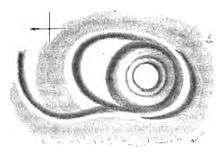John of Monmouth (died 1257)
John of Monmouth[1] (died 1257) was a feudal lord in the Welsh Marches.
Life
He was the son of John of Monmouth and his second wife Agnes, daughter of Walter de Muscegros.[2]

Penrhos Castle was the focus of a sharp dispute the younger John of Monmouth had with William III de Cantilupe.[3] There are official records showing that John was appointed custos of the castle in 1251, and William was pardoned the following year for demolishing it.[4] On the basis of documentary evidence, the castle and the dispute it created lasted from 1248 to 1253.[5]
Family and legacy
John of Monmouth died, according to the Victoria County History of Dorset, without issue.[2] He left Monmouth Castle to Prince Edward.[6] His heirs were Albretha de Boterell and Joan de Nevil, an aunt on his mother's side, and a first cousin.[2][7]
A recent scholarly source identifies another John of Monmouth, later hanged for murder, to whom this John of Monmouth left property, as a half-brother.[8] It is stated that John of Monmouth married a daughter of David, Earl of Huntingdon.[9]
Notes
- John de Monmouth, John de Munemuth, John de Monumue.
- William Henry Page, The Victoria History of the County of Dorset vol. 3 (1908), p. 58; archive.org.
- CastleFacts, Penrhos Castle. Archived 2012-08-02 at Archive.today
- "Archaeologia Cambrensis". archive.org. Retrieved 14 April 2020.
- "Gwent local history the journal of Gwent Local History Council. | 88 | 2000 | Welsh Journals - The National Library of Wales". welshjournals.llgc.org.uk. Retrieved 14 April 2020.
- Davies, R. R. "Monmouth, John of". Oxford Dictionary of National Biography (online ed.). Oxford University Press. doi:10.1093/ref:odnb/18959. (Subscription or UK public library membership required.)
- "Inquisitions Post Mortem, Henry III, File 19". British History Online. Retrieved 14 April 2020.
- D. A. Crowley (editor), A. P. Baggs, Jane Freeman and Janet H. Stevenson (1995). "Parishes: Steeple Langford". A History of the County of Wiltshire: Volume 15: Amesbury hundred, Branch and Dole hundred. Institute of Historical Research. Retrieved 12 May 2012.CS1 maint: multiple names: authors list (link)
- Alfred Theophilus Lee, The History of the Town and Parish of Tetbury (1857), p. 209;archive.org.